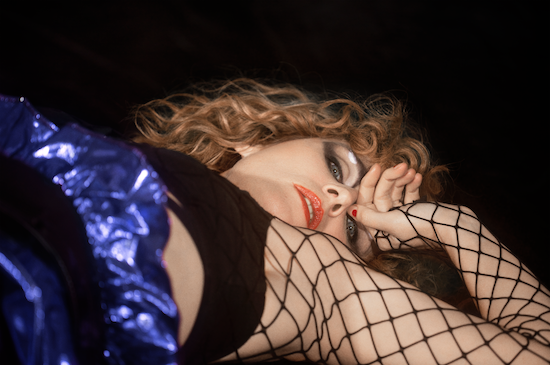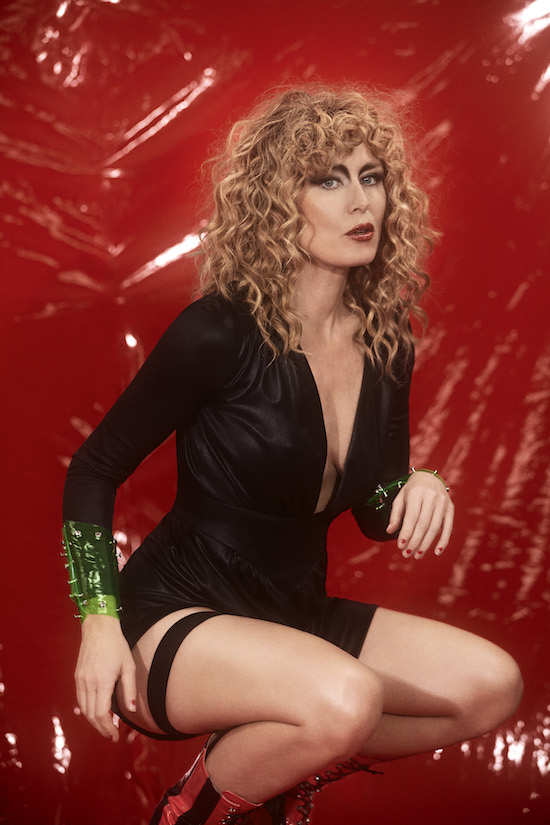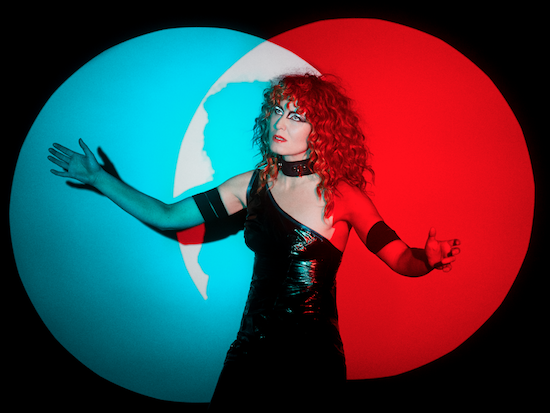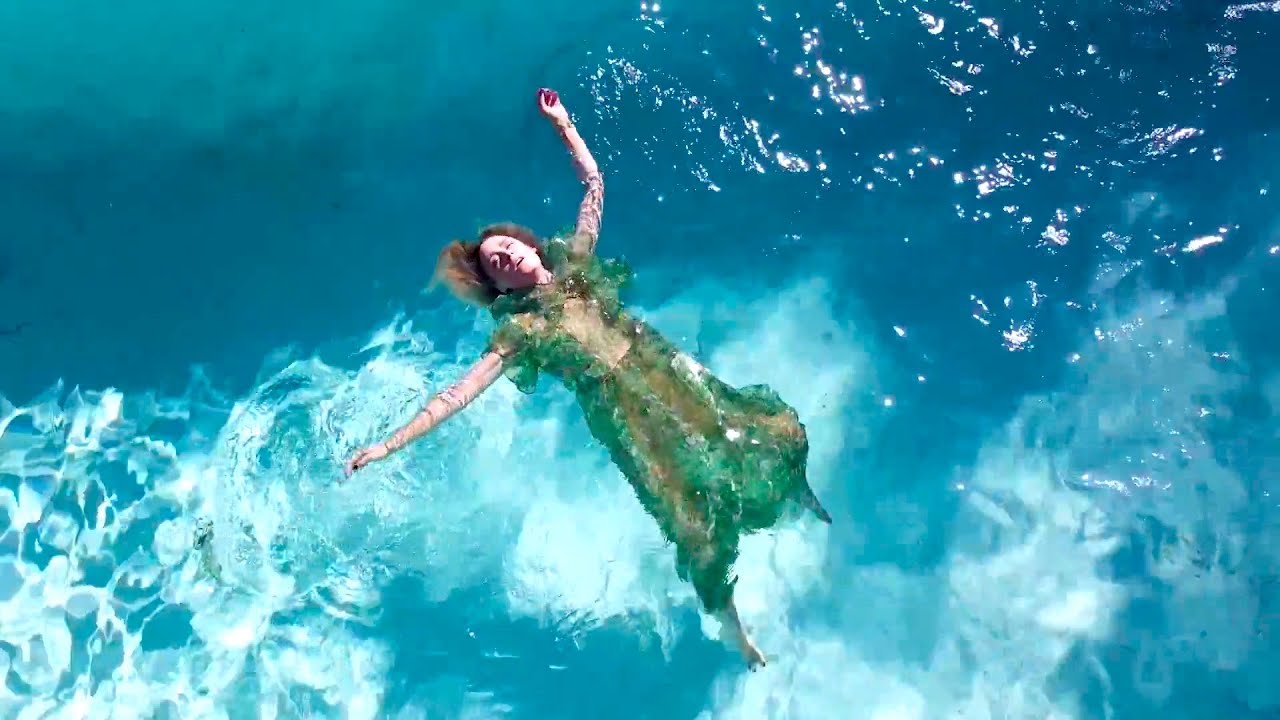When I first met Moloko in 2000, travelling with them as a music journo on a private jet to Poland for an MTV festival, Róisín wandered up and down the aisle wearing Gucci sunglasses and a sky blue T-shirt emblazoned with the word ‘EVIL’. Later that night she performed onstage in a gold trilby, with sensuality and a compelling grace. Róisín’s then musical and romantic partner Mark Brydon described her voice as like “Peggy Lee on mescaline”. That perfectly summed up her approach – hugely glamorous with jazz rigour, but at the same time surreal and off-kilter.
She sometimes wonders why she is not a mainstream star, but, as she said to me then, “You have to be a cunt to be a pop star.” Róisín has always made innovative musical choices and created videos that go deliberately against the pop narrative – more Leigh Bowery-style club kid with wonky dancing, than a slick Katy Perry. In the video for ‘Overpowered’ (2007), for instance, she plays a superstar who goes home on the night bus and stops off at the chippy, still wearing her spangly stage outfit and silver shoes. And for the constructivist allure of 2016’s ‘Ten Miles High’ she wears a fluorescent High Vis jacket and hard hat throughout.
Róisín relishes experimentation. After Moloko scored worldwide hits with the Boris Dlugosch remix of ‘Sing It Back’ in 1999 and its soulful follow-up ‘The Time Is Now’, she could have carved a very comfortable niche as a pop diva, but ‘Pure Pleasure Seeker’, with its loaded nu-jazz swagger, was more Róisín’s style. When she became a solo artist after Moloko split, she continued that move into avant pop with micro-house producer Matthew Herbert for Ruby Blue (2005). She then recorded the sparky electro-disco of Overpowered on a big budget for EMI, with a host of dance producers like Andy Cato, and Seji from the Bugz In The Attic collective. But she then switched to ruminative deep house on 2015’s Mercury-nominated Hairless Toys, recorded with long-term collaborator and Moloko keyboardist Eddie Stevens.
“Every album has been enriching, a story,” she says. “In most cases, apart from Overpowered, I work with a maverick producer who comes with his own thing. The two of us trust each other, it’s usually people in my orbit and it feels natural and unforced. It’s not made around a boardroom table. (‘Now we’ve got to make a proto-house disco record with this pretty girl [for] 75,000 people.’) Even though Overpowered was built like that there was one boss, and that was me. All the other albums were complex, deep friendships with a man, particularly Eddie Stevens, who’s a true cosmic brother.”
Her new album Róisín Machine, steeped in disco, deep house and electronic soul, is her best yet. It has been gestating for a while, ever since she recorded the opening track ‘Simulation’ ten years ago with Sheffield house producer DJ Parrott (aka Crooked Man). “Róisín Machine is very special because I’ve known Parrott since I was 19, when I moved to Sheffield. He was iconoclastic, very much part of something that had been created before, with WARP and Fon studios. Parrott is a grounding figure, part of the ground I built everything on,” she says.
Róisín recorded a few more singles with Parrott but their work was interrupted by her having two children, marrying Italian producer Sebastian Properzi (with whom she made “Mi Senti, an EP of classic Italian songs), releasing a fourth solo album (2016’s Take Her Up To Monto), and doing four glitchy, bass-driven dance EPs with Baltimore polymath Maurice Fulton. Parrott waited (slightly desperately) in the wings until Róisín was free (‘It’s like buses, they’re waiting in a line to go out,’ she laughs), and they were able to complete their album this summer for Skint/BMG. “He’s a brilliantly focused producer. Give him a goal and he’ll plot it out, he has a great sense of timing.” With its charged lyrics and booming beauty, this album perfectly captures the manic yet existential mood of 2020.
After she finished it in June, in the wake of Black Lives Matter protests, Róisín posted an impassioned 20 minute video on Instagram where she talked about the debt she owes to black music, the ‘furnace of dance music’ that has inspired her imagination. She mentions Black Uhuru, UK sound system culture, Larry Levan, Chicago house, Detroit techno and DJ producers like Masters At Work. And recalling the “misty-eyed reverence” her parents’ generation had for Motown stars and jazz greats, from Ray Charles and Nina Simone to The Temptations, she said, “Irish identification with the underdog is well-established. We’re not just talking about the underdog who merely succeeds, but the one who manages to bend reality.” In this, as an Irish woman slightly at odds with the UK music industry, she could also be describing herself. In a long Zoom interview for tQ Róisín explores the influences and inspirations that drive her.
On the opening line of ‘Simulation’, the first track on the album, you sing, “I feel my story’s still untold.” Do you feel misunderstood, that people haven’t quite ‘got’ you as an artist?
Róisín Murphy: There was a dissonance from the beginning. Me grandad says, ‘You’re a lovely lookin’ girl Róisín, why d’you have to act that way?’ The videos are beautiful, but I’m the most elegant idiot, a wonky dancer. But as the years go by the dissonances fade and soften, and the story gets bigger and bigger. I’m lucky to be a woman, I have all those archetypes to play with. In some ways it’s more difficult being a bloke. You’re at a festival and a DJ walks out and he’s got a white shirt on and looks like he came out of Foxtons. I’d rather be a woman and a solo artist – the choices are so multiple and complex and interesting and have so many threads through politics and eco-politics and socio-economics and culture and family, and sexuality, power and submission. I’m trying to hold all them sometimes in one song. It’s a juggling act.

When we first met you said, “You have to be a cunt to be a really good pop star.” Do you still think that?
RM: Yeah, I think it’s probably true. It’s easy to become a cunt. I even notice myself becoming a little bit of a cunt now, as I get a little bit more famous. I’m old enough to be allowed to be a cunt! My brother Sean, who is three years older than me, loves me and he loves Iggy Pop. He always says to me, after a few drinks, ‘You’re like Iggy Pop. Because as the years went by people realised how good Iggy Pop was… that’s the way it’s gonna be for you Rose.’
One of the most powerful tracks on the album is the huge, swirling soundscape ‘Kingdom Of Ends’, where you sound like a disembodied gospel house diva. What inspired that song?
RM: Mark Fisher. It was a phrase coined by the German philosopher Kant, and Mark Fisher used it a lot. I bought an anthology of his writing as K-Punk last year and found a review of Moloko. It was amazing to read, I wasn’t expecting it. He had a fascination with glam rock and Roxy Music and JG Ballard and Cronenberg and all the cool shit I love as well. Then threading it through with the end of desire, the end of capitalism – he throws all this into the review. It’s like in Ballard’s Crash where the heroine’s got to have the callipers, she’s got to have the car crash. Fisher described my performance as sexual, but sexual for myself. I’m not pushed or prodded out onto the stage, there’s no tap dancing, none of that. A bit like those weird Roxy Music girls, it’s all signs and signals and bots and hats and feathers and flounces, all part of an ecosystem of desire. There’s no division between natural and unnatural, pushing natural as far as it can go into the unnatural. I’m a JG Ballard sexpot!
Tell me about ‘Something More’, a slow-burn electro soul track that features US singer/songwriter Amy Douglas on vocals with you.
RM: I connected with Amy immediately. I met her at an event in Kings Cross last July, organised by DJ/promoter Joe Muggs. It was about the space and science of dub and (the late) Andrew Weatherall was on the panel. We heckled him and drank all the whisky. He started on the ‘keep it simple, stupid’ argument which I know he didn’t really believe. He said that music doesn’t have to be complicated and I had to bring in the other side of the story. Amy really knows her 70s rock, she’s very soulful, and she knows everything about whisky. I said to her, ‘Let’s do a project, a song about more and more and more and exponential need, so she went off and wrote ‘Something More’. It felt like the sort of track that Andrew Weatherall would have played at the end of a night, and the song is tied up with meeting him that night, and taking it to a melancholic place.
When I did Desert Island Disco recently for Lauren Laverne on 6Music, I tried to do a house mix and it just felt hollow. I thought, it’s not what anybody wants, we don’t want ‘giddy-up’ without the feels and the space. I’ve been obsessed with rhythm and sound and that minimal dub techno Berlin thing. That feels much more of the moment. It’s like wearing the right outfit, the right coat!
This feeling is echoed in ‘We Got Together’, with a heavy, distorted, psychedelic groove that seems to be a call to life, to unity in what has been a very strange, extreme year.
RM: Yes, it’s a big, anthemic electroclash bing bong. I can’t stop doing the ‘running man’ when I’m listening to it. You have to keep dancing. I’ve been to a few nice, small parties during lockdown, with plenty of dancing. In fact I was in Ibiza recently with my old friend (acclaimed video director) Dawn Shadforth and DJ Maya Jane Coles. They had a house with a massive sound system they’d bought off the Spiral Tribe gang, and I DJed all night, they danced all night and we had a great party, just the three of us.
One of the key album tracks is ‘Murphy’s Law’, which reminds me of early 80s freestyle disco, and repeats an earlier line, “I feel my story isn’t yet told…” How would you define Murphy’s Law?
RM: Anything that can go wrong will go wrong. My mother used to say, ‘You don’t go up the stairs you fall upstairs.’ Having said that, since I was 15, touch wood, there seems to have been some kind of force field around me. I don’t know how I didn’t get into more trouble – that’s not showing off, that’s the fucking truth. When I was 15 my parents broke up and my mother went back to Ireland. I simply couldn’t go back because they were all into heavy metal. Me dad went off with some floozy to the far reaches of north Manchester so I stayed in Stockport living with a friend and his mother until the day I turned 16 and moved into a flat. I had a group of good, solid mates, mainly lads, and they used to come round and we’d watch Twin Peaks and listen to Derek & Clive and cry laughing on the floor. We were really into music and we’d go to see bands. The British government paid my housing benefit – it was a beautiful flat in an old Victorian house with a shared bathroom and a bedroom which looked out onto a beautiful mature garden. I had an outdoor toilet, and an orange circular sofa. It was absolutely ace.
If I was to have a cause, it would be to make sure you give that opportunity to kids, because there’s not enough independence. It worries me with my kids [Róisín’s daughter Clodagh is 10, and her son Tadhg is 8.] I had total freedom, but kids these days are always looked after and supervised, it’s all playdates. Having that kind of freedom at 16 meant I learned to make decisions. There’s an awful lack of decisiveness in the creative world I float around in, a deep sense of indecision; it’s as if being decisive is rude. Freedom was the best thing that happened to me.
As a teenager you loved The Jesus and Mary Chain, Big Black, Butthole Surfers and Sonic Youth, which must have cemented your ‘weirdo’ tastes and given you a wide palette to experiment with.
RM: That attitude is 100% part of who I am – that little 14 year old watching Sonic Youth’s Daydream Nation tour in Manchester, watching them throw Kim Gordon into the audience over and over again. That mosh pit was evil, but she didn’t care. She was wearing massive glam rock boots, huge clompers that could easily kick you in the head. I’ve taken that from her, I jump into the audience as well. I was watching myself at the 6Music festival a few days before lockdown, jumping into the audience and taking shit off, taking off my gloves so I can touch people. God be with the days.
During lockdown you posted a very passionate response to the Black Lives Matter protests, about what black music means to you as an artist.
RM: I was taken by the feeling in the world. I wanted to do something and spoke to the producer Maurice Fulton, and he said, “White silence kills black people.” I also talked to Winston Hazel, my favourite DJ in Sheffield when I was growing up. I decided to go forward and post something acknowledging my influences – I’m very much someone who acknowledges her references. This also applies to gay culture, from the beginning I was aware that the music I loved came from marginalised black gay culture. That’s why when I became a gay icon of sorts, it was an extremely big honour.

You spoke about the Irish identification with the underdog – how does your Irish identity come into your work?
RM: There’s a curiosity I’ve taken from my family upbringing – better to err on the side of curiosity rather than judgement. That’s riven into the culture, along with irony and wit. I’ve got a burning ambition to make a film, a family saga from 1976-86, set in Ireland. Arklow was a very economically successful town that had a lot of local industry and entrepreneurial spirit. It was close to Dublin and a famous holiday town. My grandfather built the cinema, the Olympic size swimming pool, the dancehall – people came from all over for me grandad’s marquee dances. After he died my grandmother changed it into a snooker hall with a huge diner at the back, for which my father made all the bar furniture. His work was in the night culture. My family were wheeler dealers – one day selling a lorry load of scrap, the next day my mother selling Dutch masters at Christie’s. That clash of culture and class is pure Irish mash-up. The best awards ceremony I ever went to was the Horse Racing Awards, when I was taken by a boyfriend to one of those big hotels in Hyde Park. It was fucking brilliant. It was just before the smoking ban, we walked in and the place was full of fag smoke and everyone from every strata of Irish society. We couldn’t be stopped singing – it was the best craic ever.
Working with DJ Parrott for this record, do you feel you’re also exploring your roots in the Sheffield scene of the 1980s and 90s? From Cabaret Voltaire to Fon studios, WARP Records, clubs like Jive Turkey and Acid Blues warehouse raves, you were part of a subculture that was very creative, drawing influences from raw, underground house and techno.
RM: We were creating our own family, like in the film “Paris Is Burning, and what made the music so powerful was the fact it was contained within an area. It gets out of hand when you’re travelling around, jumping on a plane to go across the world to see 42 DJs in one night. I used to go out three nights a week in Sheffield and see the same handful of DJs every time. From scenes like that come great records, great labels, great record shops, clubs and a sense of momentum and moving forward. The environment is very important. Sheffield council was involved in giving spaces to people to learn things. Dawn Shadworth, for instance, has become a huge director. She came out of art school and didn’t know what to do. She took a year or two to gather herself, and the council provided courses in editing in used spaces across the city. That’s important. You find the small record company and it sticks and you allow it to develop. You find great DJs and continue to support them, week in, week out. The infrastructure builds and that creates brilliance. But not if you have to get on a fucking jumbo jet to see a DJ.
Is Róisín Machine a homage to this energy?
RM: Yes, in Sheffield everyone was going into these old industrial spaces. Sheffield was a a machine, a machine to build steel. I walked into a Sheffield where those big industrial spaces were lying dormant and the machines were quiet. But it’s still banging away under there in Róisín Machine. The beautiful thing about it is the pride in Sheffield, the city was the machine that powered Britain – the people know this.
The album is also about exploring space on the dancefloor – not just hedonism, but thinking things through as you dance.
RM: Please don’t stop dancing – that’s another part of my manifesto. I dance round the park and in my house. Scientists know for a fact it’s the best cardiovascular activity for your brain. It burns pathways, it’s maths and motion and absurdity and poetry. It’s magic stuff. I’ve never stopped dancing… and the record is like going back to that girl in the flat in Stockport, freaking out to Biting Tongues, rolling around on my orange sofa.
Róisín Machine is out on Skin/BMG on Friday



